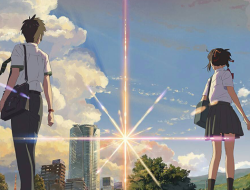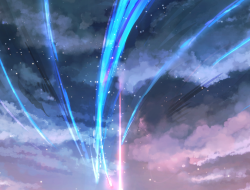Die reinste und schönste Form der Poesie – in Bild und Ton: Mit filmischen Werken wie Voices of a Distant Star, The Place Promised in Our Early Days, 5 Centimeters per Second und Die Reise nach Agartha machte Makoto Shinkai sich einen Namen in der Animeszene. Am vergangenen Donnerstag gab der Regisseur (The Garden of Words) endlich bekannt, dass er an einem neuen Projekt namens Kimi no Na wa (Engl. Titel: Your Name) arbeitet. Im Rahmen dessen wurde auch ein erster Teaser veröffentlicht. Schaut ihn euch hier unten an!
Sensei Shinkai wird nicht nur auf dem Regiestuhl Platz nehmen, sondern auch das Drehbuch zum Film verfassen. Den Posten des Animationsregisseurs übernimmt hingegen der ehemalige Studio-Ghibli-Mitarbeiter Masashi Ando (Erinnerungen an Marnie), während Masayoshi Tanaka (Toradora!) für das Charakterdesign verantwortlich ist. Außerdem fungiert CoMix Wave Inc. als Produktionsfirma. Die Stimmen der Hauptfiguren Taki Tachibana und Mitsuha Miyamizu sprechen Ryunosuke Kamiki (Das wandelnde Schloss) und Mone Kamishiraishi (Ame & Yuki – Die Wolfskinder).

Die Geschichte über Wunder und Liebe, dreht sich um Mitsuha und Taki: Erstere ist eine Highschool-Schülerin, welche in einer ländlichen Stadt in den Bergen wohnt. Ihr Vater ist der Bürgermeister und selten zuhause, und sie wohnt mit ihrer grundschulaltrigen Schwester sowie Großmutter zusammen. Mitsuha hat eine ehrliche Persönlichkeit, jedoch mag sie weder die Bräuche des familieneigenen Shinto-Schreins, noch die Tatsache, dass ihr Vater an einem Wahlkampf teilnimmt. Sie beklagt sich darüber, in einem ländlichen Städtchen zu wohnen, und sehnt sich stattdessen nach einem wundervollen Lifestyle-Leben in Tokyo. Taki ist wiederum ein Highschool-Schüler, der im Zentrum Tokyos lebt. Er verbringt viel Zeit mit seinen Freunden, arbeitet Teilzeit in einem italienischen Restaurant und interessiert sich für Architektur sowie schöne Künste. Eines Tages träumt Mitsuha davon, ein junger Mann zu sein. Taki wiederum tut selbiges, jedoch als Highschool-Schülerin, die aus einem Städtchen in den Bergen stammt, wo der Junge noch nie zuvor war. Was ist das Geheimnis hinter diesen Träumen?
Kimi No Na Wa 君の名は
Kimi no Na wa soll im August 2016 in den japanischen Kinos erscheinen. Ob oder wann der Film hierzulande zu sehen sein wird, ist noch nicht bekannt.
Your Name Romanze, Drama, Fantasy, Animation Laufzeit: 106 min von Makoto Shinkai mit Ryunosuke Kamiki, Mone Kamishiraishi, Ryo Narita Die japanischen Schüler Mitsuha und Taki sind sich nie begegnet. Während Mitsuha auf dem Land lebt und die Schule in Itomori besucht, ist Taki in Tokio zu Hause. Als Mitsuha, gelangweilt vom Leben im Nirgendwo, sich ein aufregenderes Großstadtlebe…Hello Reader! So I had to write a blog post (separate blog from this one) on my favorite movie for my “Introduction to Cinema” class and I thought it was a darn good blog post of the movie, so I want to share it with all of you (and not just my professor). I also wanted to create a movies page on my blog where I critique or talk about a movie that’s stuck with me. MAYBE I SHOULD BECOME A MOVIE CRITIC?! OR DIRECTOR!? Haha just kidding parentals…maybe. Love, Kate
‘ in English) written by Makoto Shinkai and produced by the company CoMix Wave Film, which is a Japanese animation film studio and distribution company based in Chiyoda, Tokyo, Japan. Makoto Skinkai and his team took the time to focus on every detail of the animations from the landscape to the characters to the tiniest details of the movie, ultimately making this animation aesthetically breathtaking! Not only is the animation beautifully drawn, but the soundtrack,

Kimi No Na Wa By Farras Raihan On Dribbble
by the RADWIMPS is elegant and compliments the movie entirely. Makoto Skinkai pushes his artistic abilities further by focusing on themes like distant love, time, space, traditions, destiny, and so many more!
was first premiered on August 26, 2016 and has produced a gross of $328, 013, 836 (worldwide). The film fulfills the genres of animation, drama, fantasy, and romance and is rated 9.32/10 on

“An endearingly loopy mix of time-travel, body-swap, and disaster-movie ingredients that’s already a massive hit in its native Japan” -Peter Debruge, Variety
Kimi No Na Wa / Your Name (2016)
“Part body-swap comedy, part long-distance romance, part… something else. If you only see one Japanese animated feature this year, see this one, and see it more than once” -Dan Jolin, Empire

Is about two high school students, Mitsuha Miyamizu and Taki Tachibana, witnessing a century old comet, but what they don’t know is that from that point on their lives will change forever. Mitsuha lives in a small mountain town, Itomori, in Japan with her grandmother and sister in a Shinto religious temple, her father is the mayor of the town but isn’t close to him due to tragic family history. Mitsuha dreams of leaving this small boring town and living life in the busy city of Tokyo, where no one knows her or her family history and she can be free to do whatever she pleases. Taki lives a completely different life of Mitsuha who lives in Tokyo, has a waiter job at an Italian restaurant, and dreams of becoming an architect or artist. Every night both Taki and Mitsuha have a dream of living a completely different life to which they currently live in, what’s even better is that they are living in each other’s life. But suddenly, when witnessing the comet, the dreams stop and they try to figure out why..
One of the themes to focus on in the movie is, tradition. Mitsuha lives with her grandmother and sister and performs Shinto rituals (Japanese religion) because it’s family tradition and they’ve performed rituals throughout family generations. “In contrast to many monotheistic religions, there are no absolutes in Shinto. There is no absolute right and wrong, and nobody is perfect. Shinto is an optimistic faith, as humans are thought to be fundamentally good, and evil is believed to be caused by evil spirits. Consequently, the purpose of most Shinto rituals is to keep away evil spirits by purification, prayers and offerings to the kami(God)” (japan-guide.com). The conflict behind this theme is, Mitsuha’s father, who left the religion to pursue politics within the city after Mitsuha’s mother died from illness. In a way Mitsuha’s father was more in love with his wife than the religion and could care less about the religion since his wife was no longer alive. Yikes! Family drama! This theme can be brought to real life issues all over the world, whether in Japan, United States, or any other country, politics and religion always conflict. Throughout the movie we see conflict that Mitsuha must face within her family as well as herself. Mitsuha doesn’t want to be viewed like her father by her grandmother, but she wants to get away from her small simplistic life and do what she pleases; yet she also wants to become a miko (young woman who complete rituals) to make her grandmother proud.

Makoto Shinkai Pamer Keindahan Visual Di Anime Kimi No Na Wa
Another theme to focus on in the movie is, destiny. Mitsuha and Taki stop switching bodies after witnessing the comet; Taki unconsciously draws the town of Itomori (the buildings structures, landscape, etc.) and wonders what happened to Mitsuha…and so he takes his destiny into his own hands. He travels down south with two of his friends (Tsukasa Fujii and Miki Okudera) and asks everyone if they’ve ever seen his drawings in real life. Unfortunately he finds out that Mitsuha and the entire town of Itomori were destroyed because the comet split and destroyed the town and everyone in it. Again hoping to change his destiny, as well as everyone that was killed in the disaster, he hopes to go back in time (based on the information he received while being Mitsuha and performing Shinto religion) and warn Mitsuha about the disaster. Which encourages Mitsuha to take it upon herself to control her own destiny, to finally do what SHE WANTS instead of following religious tradition or disappointing anyone. YOU GO GIRL! Part of the reason both of the characters decide to take it upon themselves to control their destiny compliments the theme of distant love and how they fall in love with each other without ever meeting one another directly, but because of the journey they’ve been on together.
The theme I believe that drives the movie the most is distant love. The irony of the theme is that they’ve never met each other (or have they?), so how is it possible to fall in love with someone that you’ve never met before? The two characters show the desire to live in a life completely opposite of their current ones which produces a FOIL for Taki and Mitsuha. Due to the body switching these two characters encounter, they are constantly living the life of the other. Yay! It’s what they’ve always wanted! FALSE. Just when they begin to get in the hang of things: Mitsuha (who is currently in Taki’s body) is helping Taki win Miki Okudera’s (Taki’s coworker) heart. Taki goes on this date with Okudera (thanks to Mitsuha) and as the date progresses he realizes that he is no longer in love with Miki Okudera (even Okudera realizes that he is in love with someone else). While this date is happening, Mitsuha fantasizes what the date would be like with Okudera and then fantasizes what the date will be like with Taki. DUN DUN DUN!!! Don’t you love rising action!? Mitsuha begins crying and she doesn’t know

“Part body-swap comedy, part long-distance romance, part… something else. If you only see one Japanese animated feature this year, see this one, and see it more than once” -Dan Jolin, Empire

Is about two high school students, Mitsuha Miyamizu and Taki Tachibana, witnessing a century old comet, but what they don’t know is that from that point on their lives will change forever. Mitsuha lives in a small mountain town, Itomori, in Japan with her grandmother and sister in a Shinto religious temple, her father is the mayor of the town but isn’t close to him due to tragic family history. Mitsuha dreams of leaving this small boring town and living life in the busy city of Tokyo, where no one knows her or her family history and she can be free to do whatever she pleases. Taki lives a completely different life of Mitsuha who lives in Tokyo, has a waiter job at an Italian restaurant, and dreams of becoming an architect or artist. Every night both Taki and Mitsuha have a dream of living a completely different life to which they currently live in, what’s even better is that they are living in each other’s life. But suddenly, when witnessing the comet, the dreams stop and they try to figure out why..
One of the themes to focus on in the movie is, tradition. Mitsuha lives with her grandmother and sister and performs Shinto rituals (Japanese religion) because it’s family tradition and they’ve performed rituals throughout family generations. “In contrast to many monotheistic religions, there are no absolutes in Shinto. There is no absolute right and wrong, and nobody is perfect. Shinto is an optimistic faith, as humans are thought to be fundamentally good, and evil is believed to be caused by evil spirits. Consequently, the purpose of most Shinto rituals is to keep away evil spirits by purification, prayers and offerings to the kami(God)” (japan-guide.com). The conflict behind this theme is, Mitsuha’s father, who left the religion to pursue politics within the city after Mitsuha’s mother died from illness. In a way Mitsuha’s father was more in love with his wife than the religion and could care less about the religion since his wife was no longer alive. Yikes! Family drama! This theme can be brought to real life issues all over the world, whether in Japan, United States, or any other country, politics and religion always conflict. Throughout the movie we see conflict that Mitsuha must face within her family as well as herself. Mitsuha doesn’t want to be viewed like her father by her grandmother, but she wants to get away from her small simplistic life and do what she pleases; yet she also wants to become a miko (young woman who complete rituals) to make her grandmother proud.

Makoto Shinkai Pamer Keindahan Visual Di Anime Kimi No Na Wa
Another theme to focus on in the movie is, destiny. Mitsuha and Taki stop switching bodies after witnessing the comet; Taki unconsciously draws the town of Itomori (the buildings structures, landscape, etc.) and wonders what happened to Mitsuha…and so he takes his destiny into his own hands. He travels down south with two of his friends (Tsukasa Fujii and Miki Okudera) and asks everyone if they’ve ever seen his drawings in real life. Unfortunately he finds out that Mitsuha and the entire town of Itomori were destroyed because the comet split and destroyed the town and everyone in it. Again hoping to change his destiny, as well as everyone that was killed in the disaster, he hopes to go back in time (based on the information he received while being Mitsuha and performing Shinto religion) and warn Mitsuha about the disaster. Which encourages Mitsuha to take it upon herself to control her own destiny, to finally do what SHE WANTS instead of following religious tradition or disappointing anyone. YOU GO GIRL! Part of the reason both of the characters decide to take it upon themselves to control their destiny compliments the theme of distant love and how they fall in love with each other without ever meeting one another directly, but because of the journey they’ve been on together.
The theme I believe that drives the movie the most is distant love. The irony of the theme is that they’ve never met each other (or have they?), so how is it possible to fall in love with someone that you’ve never met before? The two characters show the desire to live in a life completely opposite of their current ones which produces a FOIL for Taki and Mitsuha. Due to the body switching these two characters encounter, they are constantly living the life of the other. Yay! It’s what they’ve always wanted! FALSE. Just when they begin to get in the hang of things: Mitsuha (who is currently in Taki’s body) is helping Taki win Miki Okudera’s (Taki’s coworker) heart. Taki goes on this date with Okudera (thanks to Mitsuha) and as the date progresses he realizes that he is no longer in love with Miki Okudera (even Okudera realizes that he is in love with someone else). While this date is happening, Mitsuha fantasizes what the date would be like with Okudera and then fantasizes what the date will be like with Taki. DUN DUN DUN!!! Don’t you love rising action!? Mitsuha begins crying and she doesn’t know







